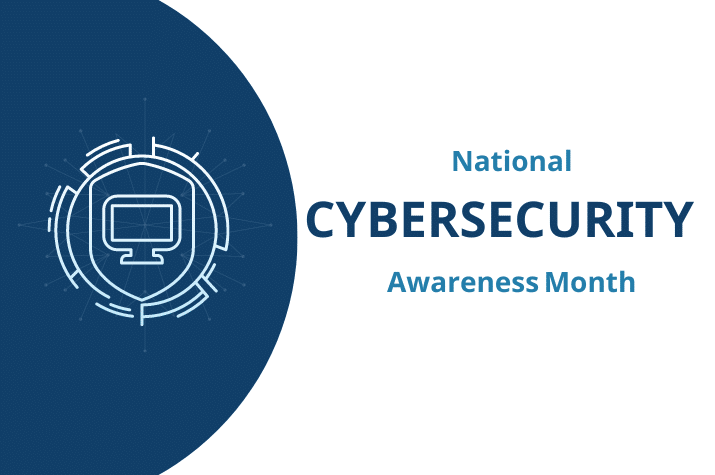October marks Cybersecurity Awareness Month, an initiative led by the Cybersecurity & Infrastructure Security Agency (CISA) to raise awareness and promote best practices for staying safe online. Now in its 21st year, this campaign has grown into a nationwide effort, encouraging businesses and individuals alike to take proactive steps in protecting themselves from cyber threats.
In 2024, the digital world continues to change rapidly, with new challenges emerging every day. AI-driven cyber attacks, the rise of deepfake technology and increased vulnerabilities in the Internet of Things (IoT) all highlight the importance of staying ahead of the curve. For organizations, especially those managing sensitive data and remote workforces, adopting cutting-edge security solutions is critical. This year’s theme, “Securing Your Digital Future,” urges everyone to take action and safeguard the future by strengthening cyber security practices today.
Emerging Cyber Security Threats
The cyber security landscape has drastically changed in the past year. Organizations must now address new and complex threats that require advanced defense strategies:
- AI-powered Attacks
Cyber criminals have increasingly adopted AI to carry out more targeted and complex attacks, making traditional security measures inadequate. AI enables the automation of phishing campaigns and exploitation of system vulnerabilities. With these more personalized and harder-to-detect attacks, human error becomes a key concern in cyber security breaches. - Deepfake Technology
The use of sophisticated video and audio manipulation to impersonate executives or employees is on the rise. Organizations must implement stringent identity verification practices to avoid falling victim to these schemes, which can lead to data breaches and financial losses. - IoT Vulnerabilities
The Internet of Things (IoT) has created a vast network of connected devices, many of which lack proper security protocols. These unsecured devices, from industrial sensors to smart home gadgets, are attractive targets for cyber attacks. Businesses should ensure they have robust security controls in place to safeguard their IoT environments. - Zero-day Exploits
As attackers constantly search for unknown software vulnerabilities, zero-day attacks are becoming more prevalent. These vulnerabilities often go undetected until it’s too late, leaving businesses exposed. Timely patch management and proactive threat monitoring are essential to prevent exploitation. - Challenges of the Hybrid Workforce
With remote work becoming the norm, businesses face a new set of cyber security challenges. From unsecured home networks to increased phishing attempts, hybrid work environments expose organizations to a broader attack surface. Protecting sensitive data across a distributed workforce is critical for maintaining cyber security integrity.
How Businesses Can Stay Secure
To combat these evolving threats, businesses must adopt a proactive approach to cyber security. Here are five key strategies to enhance security:
- Adopt Multi-factor Authentication (MFA)
Implementing MFA is a simple yet highly effective measure to secure user accounts. Requiring multiple forms of authentication significantly reduces the risk of unauthorized access, particularly for remote employees. Ensure that MFA is enforced across all systems, including cloud applications and sensitive databases. - Employee Cyber Security Training
With threats evolving, keeping employees informed about cyber security risks is crucial. Regular training sessions should cover topics like phishing detection, social engineering and deepfake awareness. Employees need to recognize suspicious activities and understand the consequences of a data breach. - Leverage Advanced Threat Detection Solutions
Traditional security tools may no longer be enough to defend against modern cyber threats. Businesses should invest in advanced threat detection solutions, such as Extended Detection and Response (XDR), which provide comprehensive monitoring and faster response to security incidents. - Enhance Third-party Risk Management
Cyber criminals are increasingly targeting vendors and third-party partners to gain access to larger organizations. Businesses should assess the cyber security practices of their partners and vendors, ensuring they adhere to strict security standards. - Encrypt Data Across All Environments
Data encryption is a critical layer of defense. Whether data is stored locally, in the cloud or in transit, encryption ensures that sensitive information remains protected even if attackers gain access to it. Regularly update encryption protocols and verify that employees are using secure methods for file sharing and data storage.
Personal Cyber Security: A Shared Responsibility
Cybersecurity Awareness Month is not just about protecting businesses. Every individual has a role to play in keeping themselves and their families safe online. Here are five personal cyber security tips to follow:
- Use Strong, Unique Passwords
Weak passwords remain one of the top causes of account breaches. Using a password manager to generate strong, unique passwords for every account can greatly reduce the risk of a cyber attack. - Be Alert to Phishing Scams
Phishing attacks are more sophisticated than ever, often mimicking trusted contacts or organizations. Always verify the authenticity of emails and texts before clicking links or providing sensitive information. - Keep Your Software Up to Date
Regular software updates are essential to patch security vulnerabilities. Enable automatic updates on all your devices, including smartphones, laptops and IoT devices. - Monitor Your Financial Accounts
Regularly checking your bank and credit card accounts for any unusual activity can help you detect fraud early. Immediately report any suspicious transactions to your bank. - Enable MFA for Personal Accounts
Just as MFA is critical for business security, it’s equally important for personal accounts. Enable multi-factor authentication wherever possible, especially for email, banking and social media accounts.
Looking Ahead to a Secure Future
As we celebrate Cybersecurity Awareness Month 2024, the message is clear: cyber security is a shared responsibility. Whether you’re a business leader, employee or individual, staying informed and proactive is the key to navigating the evolving threats of the digital age. By adopting best practices and leveraging the latest security tools, you can help protect both your organization and yourself from the growing risks of cyber crime.
